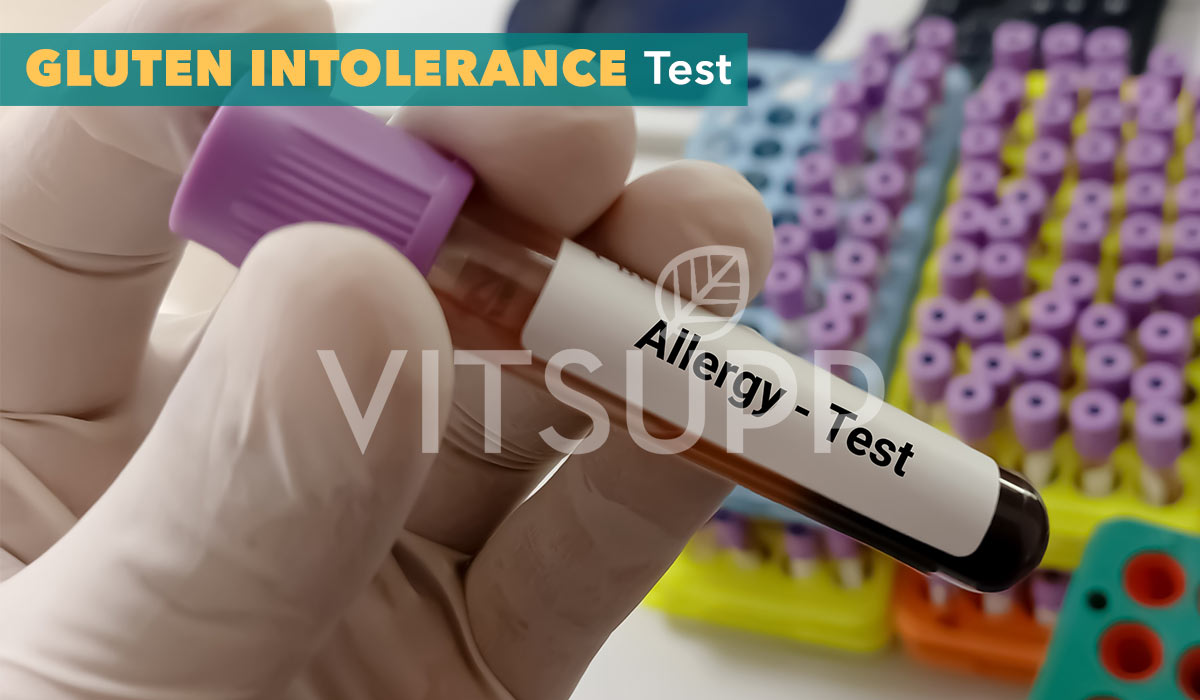Who doesn’t like cakes, pastries, and cookies? And if you’re not one with a sweet tooth, surely you love pasta and noodles? If you do, you should know that you are consuming gluten. If you are reading this article, I am sure you are concerned about gluten intolerance either you or a loved one is facing. Here is all that you need to know if you are gluten intolerant?
Today Gluten is found everywhere, it has become part and parcel of so many food products that it is virtually impossible to find anything that is gluten free. Even if you are not a foodie, something as simple as chapatis and rotis, which is a staple in many households, contains gluten.
Even though gluten intolerance is a fairly common medical condition, not many people know this disorder and its implications.
In this article, we tell you everything you need to know about gluten intolerance, its signs and symptoms, and the available treatments.
Related Article:
Contents
What is Gluten Intolerance?

Gluten refers to proteins found in certain foods, mainly wheat, barley, and rye. What we identify as gluten intolerance or gluten allergy is a medical condition wherein your body develops an adverse reaction to gluten.
When you are gluten intolerant, your immune system overreacts after consuming gluten. When the immune system reacts to this, it targets the digestive system, particularly the small intestine.
One of the most severe forms of gluten intolerance and the most popularly known us celiac disease. It is estimated that nearly one in every hundred people globally are affected by celiac disease.
Another form of gluten intolerance is non-celiac gluten sensitivity. This is much milder, as opposed to celiac disease. (source)
Gluten Intolerance Meaning
A person is considered gluten intolerant if it can cause digestive problems such as gassiness, abdominal pain, or diarrhea. However, gluten intolerance is different from Gluten Allergy or Celiac disease.
Gluten intolerances involve the digestive system. In food allergy, our immune system overreacts to a Gluten, causing potentially serious or even life-threatening symptoms. Celiac disease is an inherited autoimmune disorder that can damage the small intestine.
While avoiding gluten is a treatment strategy for all three, these are not the same conditions. (source)
Celiac Disease Vs. Gluten Intolerance

The common factor between celiac disease and gluten intolerance is gluten. We know that gluten triggers both these conditions, wherein the autoimmune system goes into overdrive and attacks the digestive system when gluten comes into the picture.
But is there a difference between the two disorders, and if yes, what is the difference?
In celiac disease, gluten triggers an adverse autoimmune response to gluten. Eventually, the immune system targets the digestive system, particularly the small intestine. The small intestine consists of fingerlike small projections known as villi. (source)
The villi’s job is to absorb nutrients from the food you consume. In the case of those affected by celiac disease, the villi get damaged, and the body, over time, becomes unable to absorb the necessary nutrients.
This disorder is also known as non-celiac gluten sensitivity. Just like celiac disease, it results from an adverse reaction to gluten. However, gluten intolerance is not as severe as celiac disease.In the case of celiac disease, the entire body has an autoimmune response to gluten, and the immune system attacks your body’s digestive system and tissue. Whereas when a person is suffering from gluten intolerance, he or she will experience symptoms that are usually short-term. These include bloating, abdominal pain, or diarrhea. (source)
Gluten Intolerance Symptoms

1 Bloating
Bloating or gas accumulation in your stomach is one of the most common symptoms of gluten intolerance. In fact, according to one study conducted on a group of people suffering from non-celiac gluten sensitivity, it was estimated that close to 87% also suffered from bloating. (source)
2 Pain in the Abdomen
Another common symptom of gluten intolerance is mild to severe pain in the abdomen. In a study conducted on a group of candidates suffering from gluten intolerance, close to 84% complained of abdomen pain as well. (source)
3 Fatigue and Tiredness
It is normal to feel tired. However, if you have been suffering from constant tiredness and fatigue, even after getting enough rest, it might be a sign of some underlying cause. One of these underlying causes is gluten intolerance.
Research suggests that fatigue and tiredness is a common symptom that accompanies gluten Intolerance, and in most cases, this feeling of tiredness is at its peak after a meal that contains gluten.
Few studies suggest that over 60 percent to 80 percent of individuals who suffer from gluten intolerance also complain of fatigue and tiredness. (source)
4 Depression
Gluten intolerance can pave the way to depression. Research suggests that individuals who suffer from one or more digestive issues are more prone to mental disorders like depression and anxiety as opposed to those who don’t suffer from a digestive condition.
This has been observed in people who are diagnosed with celiac disease. Although gluten intolerance is a condition that majorly affects the digestive system, it can also affect your mental state of mind.
For one, gluten intolerance can cause an abnormality in the serotonin levels in your body. Serotonin is a neurotransmitter. Its function is to enable the communication of cells in your body. Serotonin is also one of the happy or feel-good hormones. When there is an abnormality in the level of serotonin in your body, it may cause depression. (source)
Another way in which gluten intolerance can cause depression is due to the formation of peptides. These peptides are known as gluten exorphins. They are formed when the gluten proteins you have consumed are being digested.
Gluten exorphins can adversely affect the central nervous system at times. This, in turn, can be a causal factor of depression. (source)
Often, gluten intolerance can cause a sudden rise in gut bacteria. When there is an abnormal rise in gut bacteria, it can affect the central nervous system. This can lead to depression. (source)
5 Iron-Deficiency Anemia
Certain gluten intolerant disorders, particularly celiac disease, inhibit the absorption of nutrients from the food you consume. As a result, you will experience a deficiency of certain essential nutrients, vitamins, and minerals.
This can interfere with the absorption of iron in the body. This can lead to other symptoms, such as dizziness, shortness of breath, pale skin, headaches, and weakness. (source)
6 Autoimmune Disorders
Gluten intolerance by itself is an autoimmune condition. It can weaken your body and eventually lead to other autoimmune disorders. For example, it can potentially lead to autoimmune thyroid disease. Gluten intolerance can cause type 1 diabetes, kidney ailments, and inflammatory bowel syndrome. (source) (source)
7 Numbness in Arms and Legs
If you are gluten intolerant, you might experience a certain numbness or tingling sensation in your arms and legs. The exact reason for this symptom is not known, but some studies suggest that it could be due to the presence of certain antibodies that are associated with gluten intolerance and celiac disease. (source)
8 Brain Fog
Suppose you are unable to think clearly for no explained reason or suffering from brain fog, particularly after the consumption of gluten. In that case, chances are that you are suffering from gluten intolerance. Close to 40% of people who suffer from gluten intolerance also complain of brain fog, forgetfulness, or the inability to think clearly. The reason behind this is unknown. Certain studies claim that a brain fog due to gluten intolerance is caused due to the presence of antibodies in the body. (source)
9 Pain in the Joints and Muscles
It can cause inflammation in the joints and muscles. Additionally, those who suffer from celiac disease are genetically predisposed to be more sensitive than their healthier counterparts. (source)
10 Anxiety
Anxiety is a feeling of worry, unease, nervousness, or agitation, with or without a relevant reason. Most often, anxiety is accompanied by depression. One study conducted on a group of people who suffered from gluten sensitivity showed that 40% of them also suffered from anxiety. This supports the fact that people with gluten anxiety are prone to suffer from anxiety as well, more so than those without gluten intolerance. (source)
11 Sudden Weight Loss
Losing weight with no explanation is one of the gluten sensitivity symptoms of an underlying cause. It could also be an indication that you are suffering from gluten intolerance. Close to two-thirds of the patients who suffered from celiac disease also complained of weight loss. (source)
12 Skin Issues or Dermatitis Herpetiformis
Dermatitis herpetiformis is the manifestation of celiac disease on your skin. Other skin disorders you may suffer from if you are gluten intolerant are psoriasis, chronic urticaria, and alopecia areata. (source)
13 Headaches and Migraine
It is common to experience headaches, and many people also suffer from migraines. However, if you are gluten intolerant, you may be more prone to headaches and migraines than people who are not gluten intolerant. (source)
14 Bowel and Gastrointestinal Disorders
People with gluten intolerance often complain of constipation, diarrhea, or smelly feces. This is because gluten-intolerant disorders like celiac disease destroy the stomach lining and the small intestine. The small intestine has something known as the villi. These are small, fingerlike projections that help the body absorb nutrients from the food you eat. When a gluten-intolerant person consumes gluten, the body has an adverse reaction.
The immune system begins to attack the digestive system. In this process, the villi are destroyed, making it hard for the body to absorb nutrients from the food. Poor nutrient absorption and digestion can cause diarrhea and/or constipation.
It has been estimated that more than half of those suffering from gluten intolerance complain of diarrhea while 25 percent suffer from constipation. (source) (source) (source)
Gluten Intolerance Test

The signs and symptoms of gluten intolerance are similar to other diseases, such as lactose intolerance and irritable bowel syndrome. The gluten effects on the body can be minimal or even worse. But how to test for gluten intolerance?
If your doctor suspects gluten intolerance, you will most likely be subjected to a celiac disease test to diagnose celiac disease. Once this has been conducted and the possibility of celiac disease is ruled out, non-celiac gluten sensitivity tests will be conducted.
Gluten Allergy Test Kit
If you want to check for gluten intolerance at home, you can avail of gluten testing kits. Usually, these kits use your blood or stool sample to identify if you are gluten intolerant. However, it is worth noting that doctors do not recommend these kits.
This is because the results are not always accurate, and chances are that you may be tested false positive. Also, the problem with these kits is that it may show your case to be positive, even if you are suffering from other disorders like lactose intolerance and irritable bowel syndrome. (source)
Lab test for Gluten Intolerance
Lab tests, under the guidance of a medical practitioner, are the most reliable way to check for gluten intolerance. As mentioned above, you will likely undergo a celiac disease test. Other tests include –
- Blood tests
- Genetic testing
- Total serum IgA test
- Tissue Transglutaminase IgA antibody test
- IgA Endomysial antibody (EMA) test
- Deamidated gliadin peptide (DGP) test (source)
Gluten Intolerance Foods to Avoid

The following must be avoided if you are suffering from gluten intolerance-
- Wheat
- Barley
- Rye
- Farro
- Durum
- Emmer
- Semolina
- Spelt
- Wheat berries
- Triticale
- Farina
- Einkorn wheat
- Malt vinegar
- Brewers yeast
- Malt extract
- Malted barley flour
- Malt syrup
- Alcoholic beverages like beer and rye beer
- Wheat starch (source)
Foods to Avoid with a Gluten Allergy
Commonly consumed foods that have gluten in them include –
- Bread and other baked goods like pies, brownies, cookies, cakes, and crusts.
- Noodles (this does not include mung bean or rice noodles)
- Pasta
- Cereal
- Granola bars
- Crackers
- Pretzels
- Waffles, crepes, and biscuits
- Beer
- Malt based beverages
- Brewer’s yeast
- Sauce, especially soy sauce (source)
Gluten Allergy Symptoms in Babies
Gluten-allergic children will experience digestive symptoms similar to adults, like bloating, diarrhea, constipation, smelly, pale-colored feces, and stomach aches. In some cases, they might also experience muscle aches and body pain. (source)
Side Effects of Gluten Allergy

Here are some gluten side effects and other health conditions:
1. Cold sores and gluten intolerance
Cold sores are caused due to the herpes simplex virus. They are characterized by small sores that develop on or around the lips. No research or study suggests that there may be a link between cold sores and gluten intolerance. However, if you are suffering from gluten sensitivity, then chances are that exposure to gluten may trigger cold sores as well. (source)
2. Underactive thyroid and gluten intolerance
The research concludes that thyroid disorders like an underactive thyroid are more common in people with celiac disease or gluten sensitivity.
The thyroid is a gland that is responsible for the regulation of metabolism in your body. Located just below Adam’s apple, the thyroid gland generates your body’s necessary hormones.
There is insufficient evidence to prove the link between an underactive thyroid and gluten intolerance. However, one well-accepted fact is that both thyroid and gluten intolerance are autoimmune disorders, which may trigger the other. (source)
3. Gluten allergy and eczema
Eczema, or atopic dermatitis, is a type of skin disorder. It is characterized by red skin and rashes and a sense of itchiness.
Eczema is a chronic skin condition and is usually long-lasting. In some cases, hay fever and asthma also concurrently occur with eczema. To date, unfortunately, there is no cure for this skin condition.
The relationship between non-celiac gluten sensitivity and eczema is not very clear. Scientists conducted a study on 17 candidates suffering from non-celiac gluten sensitivity. This group of people also suffered from certain skin conditions, some dermatitis herpetiformis, eczema, or psoriasis.
For one month, these individuals switched to a gluten-free diet. Their skin conditions also improved significantly by the end of the study. A gluten intolerant meal can help get back to normal conditions.
Insufficient evidence suggests any direct link between eczema and celiac disease. However, it is worth noting that both the disorders affect people with a genetic disposition to the same.
One study concluded that eczema develops around three times more frequently among those who suffer from celiac disease. (source)
Ayurveda on gluten intolerance

In Ayurveda, digestive disorders like gluten intolerance are thought to stem from a lack of something known as the digestive fire or Agni, in Ayurveda.
Agni is often perceived as the fire within the body that burns the food we eat to make good use of its nutrition to nourish the body.
Ayurvedic practitioners believe that if the Agni or fire is weak, the body will suffer from digestive disorders, malnutrition, and gluten intolerance.
But how to reverse gluten intolerance? Gluten intolerance, also known as celiac disease, is an autoimmune disorder that cannot be completely reversed. However, it can be effectively managed by following a strict gluten-free diet. This means eliminating all sources of gluten from your diet, including wheat, barley, rye, and any products derived from them.
Ayurvedic treatment for gluten allergy
To treat sudden gluten and dairy intolerance through Ayurvedic medicine, the practitioner first removes the source of stress from your diet- gluten. After this, he eradicated the toxins from the body through various detoxification processes. Once this is done, the Agni in your body will be increased through various measures.
One of the ways to increase Agni in your body is by increasing the intake of ginger, pepper, and turmeric in your diet.
Additionally, the doctor can administer a tea containing coriander, turmeric, cumin, and fennel. This tea, in addition to increasing the Agni or digestive fire, also helps flush out toxins from your body.
No research has been conducted on the Ayurvedic approach for treating gluten intolerance.
Conclusion
If your body is incapable of handling the consumption of gluten, you will face a lot of digestive disorders, which can affect the quality of your life and lead to dangerous long-term health risks. There are a lot of gluten-related disorders. However, gluten intolerance, celiac gluten sensitivity or coeliac disease, wheat allergy symptoms in adults, dermatitis herpetiformis, and non-celiac gluten sensitivity are the most common.
While eating gluten triggers all of the above-mentioned diseases, a gluten-free diet, which consists of naturally gluten-free grains, gluten-free bread, and gluten-free foods, can improve your condition. If you are experiencing the signs and symptoms of gluten intolerance, consult a healthcare professional as soon as possible to avoid further complications.
FAQ’s
A person is considered gluten intolerant if it can cause digestive problems such as gassiness, abdominal pain, or diarrhea. Gluten intolerances involve the digestive system.
If you are experiencing any or all of the below symptoms, you could be Gluten intolerant. Below are the primary Signs and symptoms:
1 Bloating
2 Pain in the abdomen
3 Fatigue and tiredness
4 Depression
5 Iron-deficiency anemia
6 Autoimmune disorders
7 Numbness in arms and legs
8 Brain fog
9 Pain in the joints and muscles
10 Anxiety
11 Sudden weight loss
12 Gluten intolerance skin bumps or dermatitis herpetiformis
13 Headaches and migraine
14 Bowel and gastrointestinal disorders
In the case of celiac disease, the entire body has an autoimmune response to gluten, and the immune system attacks your body’s digestive system and tissue. Whereas when a person is suffering from gluten intolerance, he or she will experience symptoms that are usually short-term. These include bloating, abdominal pain, or diarrhea. (source)
Gluten allergy is a medical condition wherein your body develops and reacts adversely to gluten.
When you are gluten intolerant, your immune system overreacts after consuming gluten. When the immune system reacts to this, it targets the digestive system, particularly the small intestine. There are several effects of gluten intolerance.
Celiac disease is one of the most severe forms of gluten intolerance and the most popularly known. It is estimated that nearly one in every hundred people globally are affected by celiac disease. Another form of gluten intolerance is non-celiac gluten sensitivity. This is much milder, as opposed to celiac disease. (source)
Gluten or Lactose is the most common food sensitivity anybody can have. The symptoms of gluten and dairy intolerance are quite similar and, at a time, can occur in an individual simultaneously. Therefore, it isn’t easy to find what could be bothering you. In both, you will face digestive issues such as bloating, gas, problems with bowel movements, abdominal pain, fatigue, and headaches. The simple non-lab test is to alter and change your diet to determine what could be bothering you. However, it is sometimes wise to go for the blood test route to find what is bothering you.
Here are the signs of the disease in adults:
1 Bloating
2 Pain in the abdomen
3 Fatigue and tiredness
4 Depression
5 Iron-deficiency anemia
6 Autoimmune disorders
7 Numbness in arms and legs
8 Brain fog
9 Pain in the joints and muscles
10 Anxiety
11 Sudden weight loss
12 Skin issues or dermatitis herpetiformis
13 Headaches and migraine
14 Bowel and gastrointestinal disorders
The consumption of the following food may cause gluten intolerance among some individuals:
Wheat
Barley
Rye
Farro
Durum
Emmer
Semolina
Spelled
Wheat berries
Triticale
Farina
Einkorn wheat
Malt vinegar
Brewers yeast
Malt extract
Malted barley flour
Malt syrup
Alcoholic beverages like beer and rye beer
Wheat starch (source)
Yes, celiac disease can develop later in life, even if you have previously been able to tolerate gluten without any issues. While celiac disease is often diagnosed in childhood, it can manifest in adulthood. This phenomenon is known as “late-onset” or “adult-onset” celiac disease.


